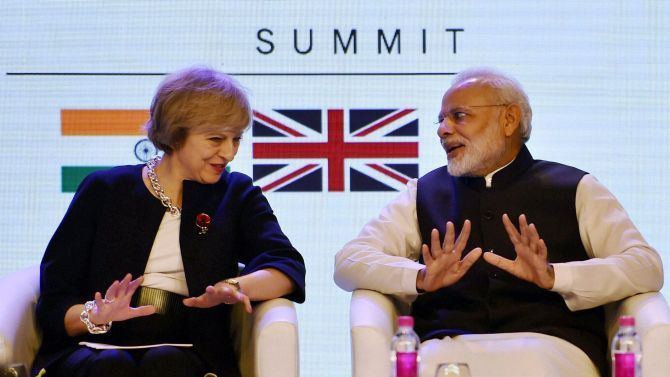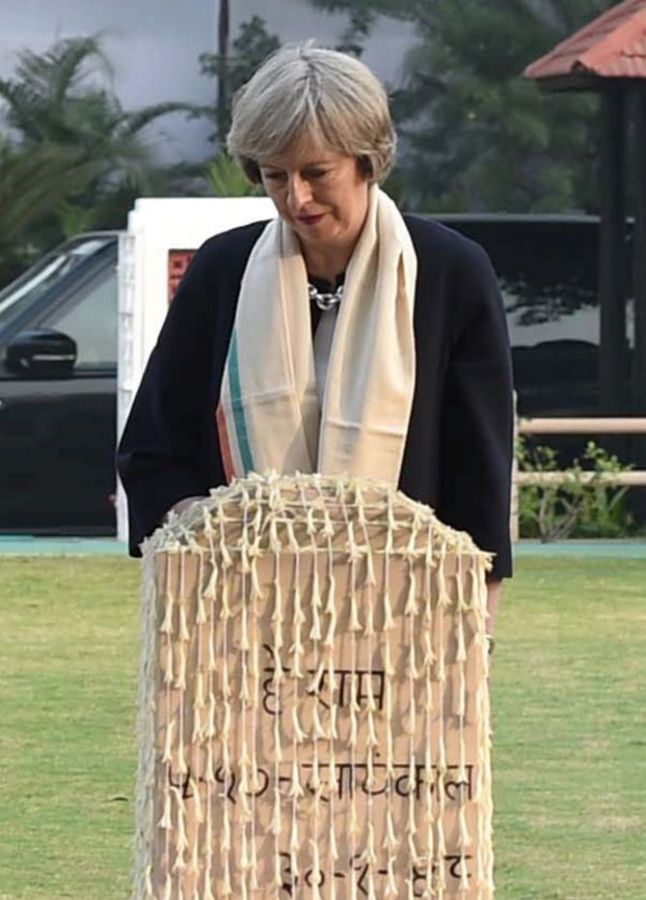Boosting trade and simplifying visa regime, apart from security and defence cooperation, were among the key bilateral issues. The two leaders also discussed regional and international matters of mutual interest.

India and Britain on Monday pledged to fight terrorism and bring to justice terror groups and those who encourage them even as the two countries agreed not to allow fugitives escape law in each other’s territory.
As British Prime Minister Theresa May made her first bilateral visit outside Europe and held extensive talks with her Indian counterpart Narendra Modi, officials handed over a list of 57 fugitives New Delhi wants to be extradited and hoped for early extradition of industrialist Vijay Mallya to face probe in the money laundering case against him.
After more than three hours of ‘extensive’ talks, the two prime ministers agreed on boosting trade ties, with May saying that during her visit alone, India and the United Kingdom will ink more than GBP 1 billion (Rs 83,00 crore) of business deals.

At a joint press interaction with Modi, May announced two business-centric visa programmes -- Registered Traveller Scheme and Great Club -- while India drew her attention to its students and working professionals getting impacted by the stringent visa norms in the UK. As per official UK figures, the number of study visas issued to Indian nationals fell from 68,238 in 2010 to 11,864 this year.
While boosting trade and simplifying visa regime apart from security and defence cooperation were among the key bilateral issues, the two leaders also discussed regional and international matters of mutual interest including the need for South Asia to be stable, prosperous and free from terror.
They called upon all countries to work towards that goal.

‘Both prime ministers acknowledged that terrorism and violent extremism poses one of the most serious threats to international peace and security and in this regard called for concerted global action without selectivity. The two leaders called for urgent measures to counter and prevent the spread of terrorism, violent extremism and radicalisation,’ a joint statement issued after the talks said.
The two sides underlined the importance of maintaining the legal order for the seas and oceans based on the 1982 United Nations Convention on the Law of the Sea.
The remarks are seen as a veiled reference to the recent order by the UN on the South China Sea that was criticised by China, which refused to accept it.
Reaffirming their respect for and commitment to the freedom of navigation and over-flight based on the universally recognised principles of international law, as reflected in the UNCLOS, the two leaders stated that all related territorial and jurisdictional disputes should be resolved by peaceful means, without resorting to the threat or use of force.
‘They urged states to respect UNCLOS and refrain from activities which prejudice the peace, good order and security of the oceans,’ the statement said.

Earlier in the day, May, who arrived in New Delhi on Sunday night, inaugurated UK-India Tech Summit jointly with Modi and will fly to Bangaluru on Tuesday where she will attend business events.
On bilateral defence cooperation front, Modi said, “I encourage British companies to look at the multiple opportunities in the Indian defence sector. Looking beyond trade in defence equipment, I invite them to build partnerships with Indian enterprises that focus on manufacturing, technology transfer and co-development.”
Recognising the potential for cooperation in defence manufacturing between the British and Indian companies in the ‘Make in India’ framework, the two sides agreed to encourage and facilitate such cooperation.
The UK will continue its engagement with the Indian Ministry of Defence and Indian defence companies to simplify and expedite export control regimes and to support the transfer of technology to enable projects in areas of mutual interest.
‘The two prime ministers tasked the Defence Consultative Group (DCG) on 15-16 November 2016 to advance the bilateral defence cooperation agenda, including the UK's proposals for capability partnerships, through a range of activities including military to military cooperation, training, exchange of subject matter experts, research and technology linkages as well as defence manufacturing,’ the joint statement said.

Noting that ongoing cooperation between HAL and BAE Systems in manufacturing Hawk Advanced Jet Trainers in India was an example of partnership in defence manufacturing, the prime ministers agreed to apply innovative approaches to jointly promote products and services in international markets.
Britain also reaffirmed its support to India’s bid for permanent membership of the UN Security Council and the prime ministers directed their officials concerned to have ‘close and regular consultations’ on all matters related to the international body.
The United Kingdom also welcomed India’s entry into the Missile Technology Control Regime, a key global non-proliferation objectives, and backed India’s bid for membership of the Nuclear Suppliers Group as well as other key export control regimes like the Australia Group.
Modi and May also welcomed a fourth phase of the Joint UK-India Civil Nuclear Research Programme that will look at new technologies for enhancing nuclear safety, advanced materials for nuclear systems, waste management and future civil nuclear energy systems.

The leaders directed their officials to have close and regular consultations on all matters related to the United Nations, including UN terrorist designations.
Recognising that Anti-Microbial Resistance is a global challenge, India and the UK announced new research partnerships worth GBP 80 million (Rs 660 crore), including establishment of a joint strategic group on AMR with a joint investment of up to GBP 13 million (Rs 107 crore).
The two sides said they would work together to support the multi-stakeholder model of internet governance.

‘The growing India-UK cyber relationship is a success story of the Defence and International Security Partnership (DISP),’ the joint statement said.
The two PMs also expressed desire to enter into a Framework for the UK-India Cyber Relationship.
Projects to reduce post-harvest losses to benefit farmers, collaborations in health care and the launch of the second phase of joint research in women and children's health in low-income settings were also announced.
May also signalled the UK’s intention to join the International Solar Alliance.
In their joint statement, both the PMs said they look forward to the celebration of 2017 as the India-UK Year of Culture and support the activities and programmes being planned, for example an exhibition of Indian Science in the Science Museum in London and another highlighting 400th death anniversary of William Shakespeare.










 © 2025
© 2025